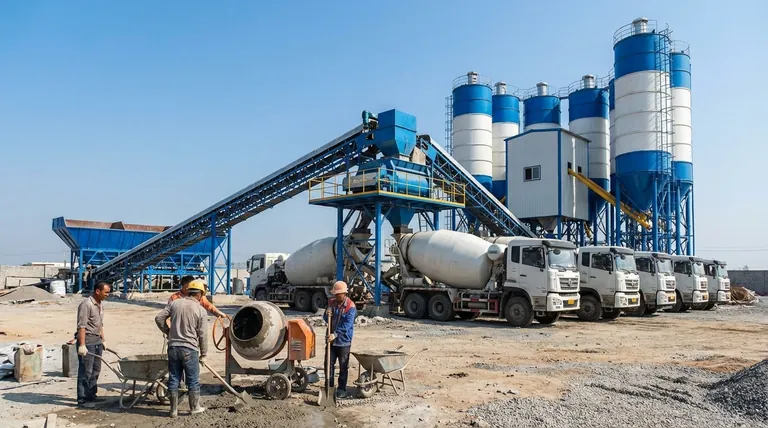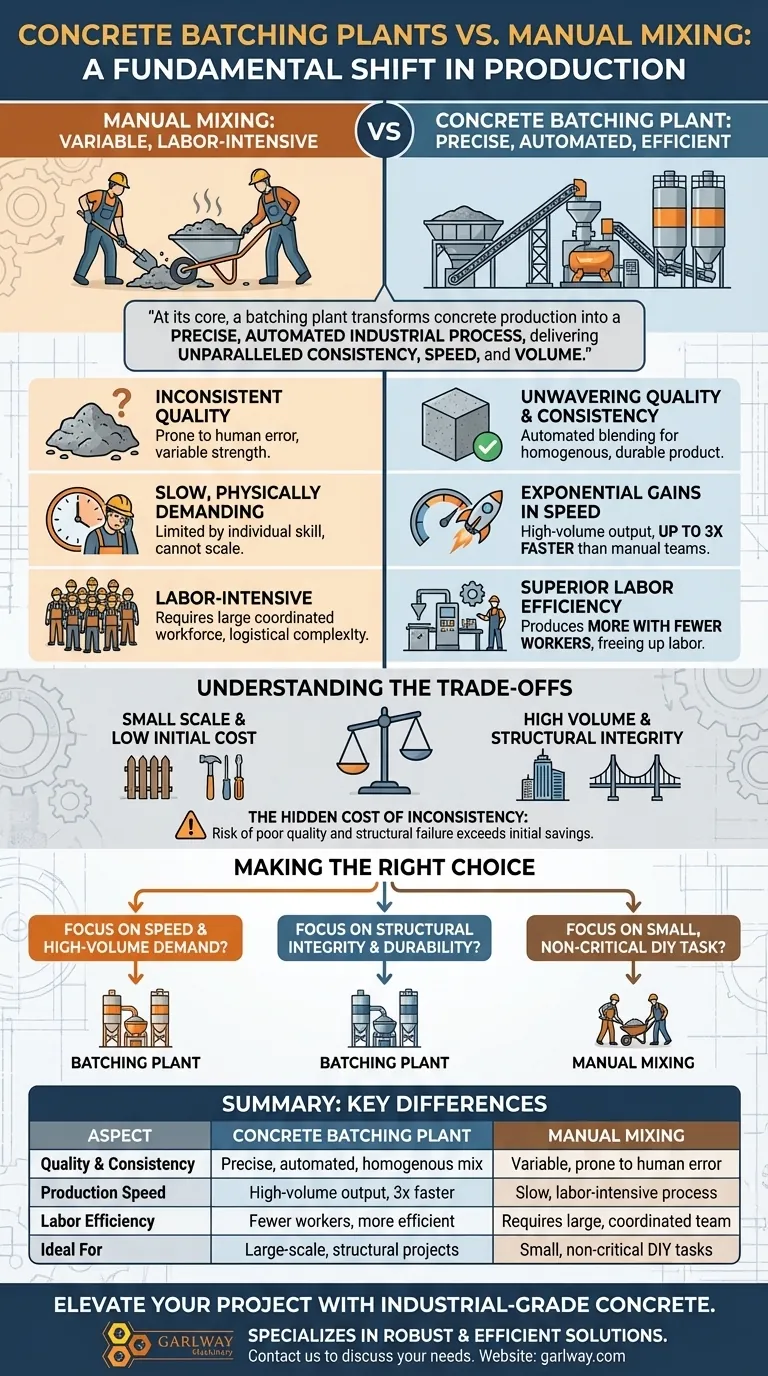At its core, the advantage of a concrete batching plant is its ability to transform concrete production from a variable, labor-intensive task into a precise, automated, and highly efficient industrial process. Unlike manual mixing, which is prone to human error, a batching plant delivers unparalleled consistency, speed, and volume, ensuring the quality required for modern construction.
The decision between a batching plant and manual mixing is fundamentally a choice between industrial-grade precision and small-scale convenience. While manual mixing has its place, a batching plant is the only method that guarantees the structural quality, speed, and efficiency required for any significant project.

The Core Pillars of Batching Plant Superiority
The advantages of a concrete batching plant are not incremental; they represent a fundamental shift in how concrete is produced, impacting quality, speed, and resource management.
Unwavering Quality and Consistency
Manual mixing is inherently inconsistent. The final product's quality depends entirely on individual skill, leading to lumpy textures and unreliable strength.
A concrete batching plant uses automated systems to precisely measure and blend cement, water, and aggregates. This ensures a thoroughly mixed, homogenous product every single time.
This consistency is critical for creating durable, reliable concrete that meets engineering specifications and enhances the longevity of the structure.
Exponential Gains in Speed and Volume
Manual mixing is a slow, physically demanding process that cannot scale to meet project demands.
Batching plants are designed for high-volume output, capable of producing up to three times more concrete per hour than a manual team.
This dramatic increase in production speed and efficiency allows projects to meet tight deadlines and handle high-demand scenarios with ease.
A Fundamental Shift in Labor Efficiency
Achieving significant volume with manual mixing requires a large, coordinated workforce, which introduces costs and logistical complexity.
A batching plant produces larger quantities of concrete with fewer workers, freeing up valuable labor for other critical tasks on the job site.
This reduction in direct labor and effort per cubic meter of concrete makes the entire construction process more efficient and cost-effective.
Understanding the Trade-offs
While technologically superior, a batching plant is not the universal solution for every concrete need. Understanding its context is key.
The Matter of Scale
For extremely small, non-structural applications—like setting a single fence post or patching a small crack—the setup and operation of a batching plant are entirely impractical.
In these limited scenarios, manual mixing is a perfectly adequate and cost-effective solution.
Initial Investment and Logistics
The primary barrier to a batching plant is the significant upfront capital investment and the logistical requirements for site preparation, installation, and operation.
Manual mixing, by contrast, requires only basic tools and has a negligible initial cost.
The Hidden Cost of Inconsistency
The true trade-off is risk. While manual mixing appears cheaper for smaller jobs, its inconsistency introduces a high risk of poor quality, weak spots, and potential structural failure.
The cost of rework or failure resulting from poor manual mixing can far exceed the initial savings, making batch-plant concrete the safer investment for any project where structural integrity matters.
Making the Right Choice for Your Project
Choosing your concrete production method depends entirely on the requirements and risks of your specific application.
- If your primary focus is structural integrity and long-term durability: A batching plant is the only choice to guarantee consistent, high-strength concrete.
- If your primary focus is speed and meeting a high-volume demand: A batching plant is essential to achieve the necessary production rate and project efficiency.
- If your primary focus is a very small, non-critical DIY task: Manual mixing is a practical and economical solution.
Ultimately, selecting the correct production method is a foundational decision that directly impacts your project's quality, safety, and success.
Summary Table:
| Aspect | Concrete Batching Plant | Manual Mixing |
|---|---|---|
| Quality & Consistency | Precise, automated, homogenous mix | Variable, prone to human error |
| Production Speed | High-volume output, 3x faster | Slow, labor-intensive process |
| Labor Efficiency | Fewer workers, more efficient | Requires large, coordinated team |
| Ideal For | Large-scale, structural projects | Small, non-critical DIY tasks |
Ready to elevate your construction project with industrial-grade concrete?
GARLWAY specializes in providing robust and efficient concrete batching plants for construction companies and contractors globally. Our solutions deliver the unwavering quality, speed, and efficiency your projects demand.
Contact us today to discuss your specific needs and discover how our concrete batching plants can ensure the success and durability of your structures. Get in touch via our contact form for a personalized consultation.
Visual Guide

Related Products
- HZS180 Ready Mix Concrete Plant for Foundations with Sand and Cement
- HZS75 Concrete Batching Plant Cement Mixer Price Concrete Mixer Bunnings Mixing Plant
- HZS120 Ready Mix Concrete Batching Plant Commercial Mud Cement Mixer
- HZS35 Small Cement Concrete Mixing Batch Plant
- Portable Concrete Mixer Machine Equipment for Mixing Concrete
People Also Ask
- How much does a batching plant cost? Uncover the True Investment for Your Project
- What are the disadvantages of ready mix concrete? Navigating Logistical and Cost Challenges
- What are the different types of cement plants? A Guide to Wet Mix, Dry Mix, Stationary & Mobile Plants
- What are the advantages of ready mix concrete? Higher Quality, Efficiency & Cost Savings
- How to make ready mix concrete stronger? Boost Strength with Proven Mixing Techniques
















